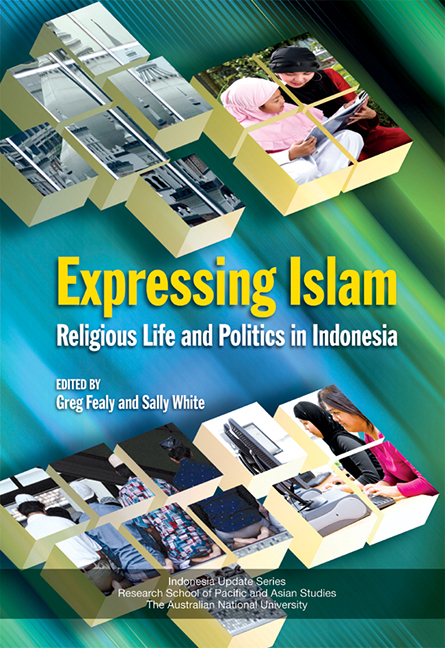Book contents
- Frontmatter
- Contents
- List of Figures and Tables
- List of Contributors
- Acknowledgments
- Glossary
- Map
- 1 Introduction
- PART I EXPRESSING PERSONAL PIETY
- PART II POLITICAL, SOCIAL AND LEGAL EXPRESSIONS OF ISLAM
- 7 Religion, Politics and Social Dynamics in Java: Historical and Contemporary Rhymes
- 8 Islam and Gender in Contemporary Indonesia: Public Discourses on Duties, Rights and Morality
- 9 Online Fatwa in Indonesia: From Fatwa Shopping to Googling a Kiai
- 10 Regional Sharia Regulations in Indonesia: Anomaly or Symptom?
- 11 ‘As Long as It's Halal’: Islamic Preman in Jakarta
- 12 Indonesian Terrorism: From Jihad to Dakwah?
- PART III THE ISLAMIC ECONOMY
- Index
- Indonesia Update Series
- Plate section
11 - ‘As Long as It's Halal’: Islamic Preman in Jakarta
from PART II - POLITICAL, SOCIAL AND LEGAL EXPRESSIONS OF ISLAM
Published online by Cambridge University Press: 21 October 2015
- Frontmatter
- Contents
- List of Figures and Tables
- List of Contributors
- Acknowledgments
- Glossary
- Map
- 1 Introduction
- PART I EXPRESSING PERSONAL PIETY
- PART II POLITICAL, SOCIAL AND LEGAL EXPRESSIONS OF ISLAM
- 7 Religion, Politics and Social Dynamics in Java: Historical and Contemporary Rhymes
- 8 Islam and Gender in Contemporary Indonesia: Public Discourses on Duties, Rights and Morality
- 9 Online Fatwa in Indonesia: From Fatwa Shopping to Googling a Kiai
- 10 Regional Sharia Regulations in Indonesia: Anomaly or Symptom?
- 11 ‘As Long as It's Halal’: Islamic Preman in Jakarta
- 12 Indonesian Terrorism: From Jihad to Dakwah?
- PART III THE ISLAMIC ECONOMY
- Index
- Indonesia Update Series
- Plate section
Summary
INTRODUCTION
According to the United States Department of State, Indonesia is a very dangerous place teeming with terrorist activities. Personally, the terrorists I'm more worried about are the ones out and about on the streets, pretending to be parking attendants, buskers, etc. (Piting 2004).
This quote from the Jakarta Post encapsulates a grim daily reality faced by the residents of Indonesia's capital. Fear of extortion, harassment or violence at the hands of preman, a colloquial term for a street thug or gangster, is for many Indonesians a significant and recurrent threat to their personal security. While Western governments and media continue to focus upon an ‘Islamist threat’ in Indonesia, it is a more mundane but pervasive form of everyday terror that has a greater impact on the lives of ordinary Indonesians. Street-level thuggery at the hands of preman is a ubiquitous part of life in urban centres throughout the country.
There has been a discernible increase in premanisme since 1998. However, preman are by no means a new phenomenon. Throughout the New Order, a symbiotic relationship existed between elements of the regime and preman, many of whom were ‘institutionalised’ within paramilitary and youth organisations such as the regime loyalists Pemuda Pancasila (Pancasila Youth). Preman were allowed to operate protection rackets with virtual legal impunity on the condition that a proportion of their profits made its way through the state bureaucracy, and that they were available to be mobilised when the state felt its hegemony to be under threat.
Towards the end of the New Order, as the image of a unified regime began to fracture, the ideology and symbolism of many of these ‘entrepreneurs in violence’ began to shift away from reactionary nationalism and loyalty to Soeharto and Golkar, and was increasingly derived from militant Islam. This shift reflected the changing political dynamics. Many preman gambled on which political force would come out on top. Some flocked to the satgas paramilitary wings established by political parties to mobilise support and raise revenue in the wake of the 1999 elections. Others joined the ranks of the plethora of militant Islamic organisations that emerged after 1998. Many of these groups were mobilised in November 1998 as part of the civil militias deployed by General Wiranto.
- Type
- Chapter
- Information
- Expressing IslamReligious Life and Politics in Indonesia, pp. 192 - 210Publisher: ISEAS–Yusof Ishak InstitutePrint publication year: 2008

